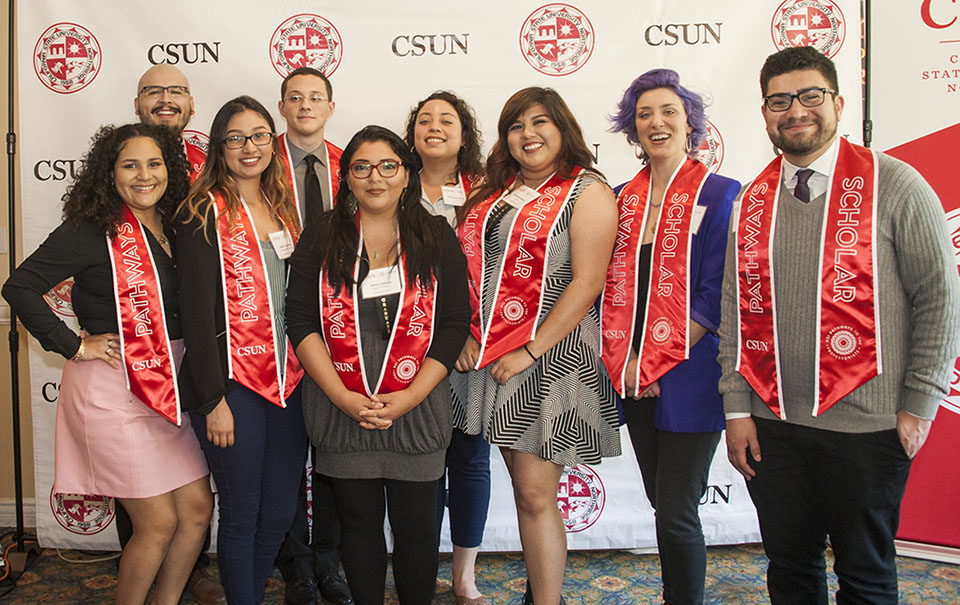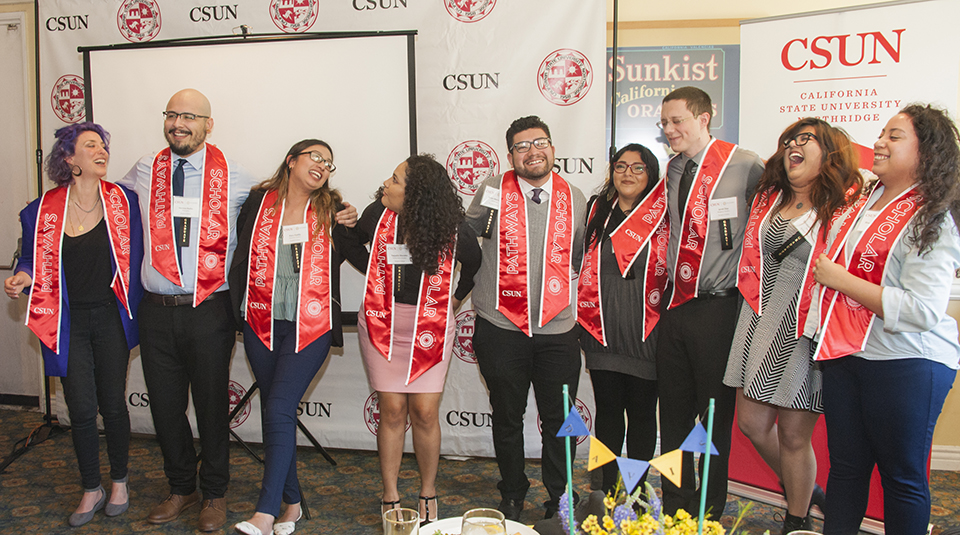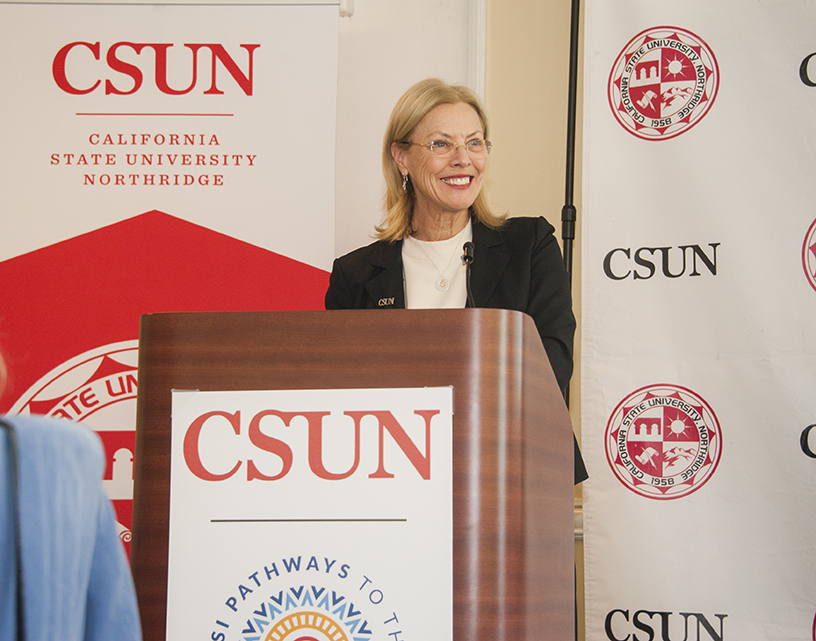CSUN’s Entire Inaugural HSI Pathways Cohort Receives Full Funding to Prestigious Ph.D. Programs
The goal of California State University, Northridge’s HSI Pathways to the Professoriate is to make the journey to becoming a professor easier to navigate for students, including Latina/o students, in the humanities and related fields.
CSUN, a Hispanic Serving Institution (HSI), partners with the University of Pennsylvania Graduate School of Education’s Center for Minority Serving Institutions to increase the presence and visibility of Latina/o faculty members. HSI Pathways is open to CSUN students in their junior year whose majors match a list of specified fields, and who want to get a Ph.D. and become a professor. The cohort provides research opportunities and the preparation needed to get a doctorate.
Eight of nine students in the inaugural cohort applied to Ph.D. programs this year, and all eight who applied have received multiple acceptances with offers of full funding to prestigious Ph.D. programs nationwide — an exemplary 100 percent rate. On April 20, HSI Pathways held an event at the Orange Grove Bistro to congratulate the graduating group and introduce the second cohort.
“I’m excited for them,” said HSI Pathways program coordinator Heidi Schumacher. “These are really brilliant scholars, and the fact that they’ll be a part of the professoriate is so exciting. I’m proud to have this high of a success rate, which is a testament to how hard they worked and to how many people at CSUN participated and helped these students out.”
The students in the inaugural cohort receiving graduate funding to Ph.D. programs are:
Shawntel Barreiro
In the fall, Shawntel Barreiro will be attending The Ohio State University to obtain her Ph.D. in linguistics, with a specialization in Central American sociolinguistics. Barreiro thanked HSI Pathways for getting her to where she is today.
“It gave me the resources to be able to get into a Ph.D. program, and it fostered this new sense of how I felt as a scholar and solidified everything that I wanted to do as a researcher, as a student,” she said. “It also goes beyond that, because there’s this sense of camaraderie that we have all created amongst ourselves: in the cohort, with the mentors, and with Heidi, who has been the heart and soul of this program.”
Through this intense program, Barreiro said her parents were her inspiration. She especially takes pride in being the daughter of immigrants from El Salvador, who left the country when the country’s civil war broke out in the 1980s. In 1985, her parents left everything that was familiar to them to start a new life.
“I think that the reason why I pushed myself to do all the things that I have done is because I’ve had my parents as motivators,” she said. “Looking back at it, they came here with little to no money, little to no English, and they were able to give me a life that I think any child would want to have. I grew up with parents who have really instilled in me what it means to be persistent, what it means to be hardworking, and the community that I grew up in, South Central, has also been really pivotal to my successes.”
Barreiro wants to make sure that she uses the privilege and honor of having a Ph.D. to give back to students who come from similar backgrounds.
As for being able to represent CSUN, “this program shows that its students are capable of being amazing scholars,” she said.
Elizabeth Calzada
For recipient Elizabeth Calzada, it was a big surprise to be able to receive such a prestigious award. The opportunity will allow her to attend the University of Minnesota’s history doctoral program.
“I didn’t think that I was going to get the graduate funding,” Calzada said. “I didn’t think that I would go from a bachelor’s to a doctorate, which is a huge leap in itself. This program turned my life upside down. I received so much support from my mentors, from Heidi and our cohort members. There are resources there that I never would’ve thought I’d have, and I do. That’s the biggest thing.”
She decided to pursue professoriate after noticing that not many of her professors looked like her.
“I want to be a professor to get more Latino representation in the professoriate,” Calzada said. “I mean you see it even here, in institutions like CSUN that is an HSI campus, there’s still a big gap [in Latina/o professors]. Imagine what the gap is like in schools that aren’t HSI, so that’s pretty huge.
“Being in HSI Pathways has brought me closer to my career goals. I’ve always known that I wanted to be a professor, but this program secured it and made it more realistic. It just made things more plausible and more likely to happen than if I was to just do it on my own.”
Receiving the full funding is even more special to Calzada, because she’s the first in her family to reach the doctorate level of higher education.
“I’m a first-generation American, so my parents never got much of an education,” she said. “My mother went up to first grade, my father went up to sixth grade, so we never really had much on how to apply to college or anything like that, any resources. That was really tough, because my parents wanted to help, but they didn’t know how. When they found out about the award, they were really proud.”
Jared Diaz
For recipient Jared Diaz, college wasn’t always an option. Growing up on the autism spectrum, he had a particularly difficult time in school.
“In my elementary years, I was diagnosed with Asperger’s, and there were many things that I’ve had to overcome,” Diaz said. “I struggled with social interaction, making friends, and having to navigate the complex nature of the school as an institution. I had teachers that would tell my parents not to expect much for me. ‘College may not be an option,’ they said. ‘He may not be able to take care of himself on his own,’ that kind of thing. Seeing how far I’ve come now to preparing to enter a Ph.D. program makes me feel good to know that they were wrong.”
Despite a difficult childhood, Diaz has now accepted an offer for a fully funded Ph.D. program at Arizona State University for religious studies. He thanks HSI Pathways for opening opportunities like these for him.
“HSI Pathways is basically the reason why I’m looking at the offers I have,” he said. “I never would’ve thought to try to apply for a Ph.D. program in any school. It gave me a lot of opportunities that I wouldn’t have at this point. I am where I am now because of this program.”
Diaz explained what inspired his goal to want to be a professor.
“I’ve always just enjoyed the process of learning and being inside and outside of the classroom, whether that is one-on-one work, or doing research and producing new knowledge to provide to your field that further knowledge,” he said. “Just the whole process of learning has always been a pleasure to me. Continuing that is something that I’ve wanted to do, and HSI Pathways has put me along the path of that goal.”
Yaquelin Morales
Inspired by family, a Los Angeles Latina-based poetry group and HSI Pathways colleagues, Yaquelin Morales successfully received an acceptance to the performance studies program at Northwestern University. The performance studies program analyzes performance to engage history, culture and human expression. She plans on doing ethnographic work on the performance of women’s activism.
As the first in her family to attend college, Morales feels grateful for the “continuously expanding opportunities” CSUN’s HSI Pathways program has provided. She hadn’t considered a Ph.D. program until CSUN professor Melisa Galván explained the opportunity to her Gender and Women’s Studies class.
“I guess I never really thought about a Ph.D. until that moment,” she said. “It seemed like something very far away. It wasn’t until I started the program that everything was broken down for me. They demystified the whole process.”
After attending summer workshops with her cohort, traveling to universities nationwide and gaining a sense of morale from Schumacher, Morales gained lasting friendships and a “genuine love for people’s success.”
“Every time somebody got an acceptance into a program, we were genuinely happy for them,” Morales said. “In many academic spaces there is a sort of competitiveness. Ultimately, everyone succeeded.
“It has definitely brought a lot of attention from other universities to our institution,” Morales added. “It puts more light that CSUN students have the ability if given the right tools.”
Brian Mercado
Brian Mercado will be studying sociology with a concentration on education at the Graduate Center at the City University of New York next fall.
“I had the sense that [New York is where] I’m meant to be, this is what I’m supposed to be doing,” said Mercado.
Discussing both graduate school and the HSI Pathways program, Mercado said there was much he had learned, and he appreciated all members of his cohort, his coordinator, his mentor and everyone affiliated with the program for being his support system.
“The mission of the program is to diversify the professoriate,” he said. “[As a professor], I believe I can open doors for people that have had different experiences.”
As soon as he finished his first sociology course, Mercado said he knew he wanted to pursue a doctorate, because he fell in love with the subject matter. “I love theories, so I figured I could combine theory with teaching and become a professor, but also do my research on theory and people that are disenfranchised by the system of education.”
For his research project, Mercado interviewed high school administrators on their perception of low-income students of color. When reflecting on the future, Brian said that his thoughts on potential dissertation topics included: drug use among students, toxic masculinity of students within school settings and using Marxist theory to relate students to the laborer and draw parallels between the processes of alienation that both groups experience.
“When I was a high school senior, my mom was getting her GED while also studying for her citizenship test,” Mercado said. “That really inspired me. I love my mom. I look up to her. If she was in a different space, she could have gone so much farther. Seeing her in her 30s completing all of these things was very impactful for me.
Hermes Rocha
Hermes Rocha, a double major in philosophy and religious studies, wants to get involved with politics and “contribute to society with philosophical ideas.”
As a lover of philosophy and his Mexican culture, Rocha plans to bring non-European Western philosophies into the academic world as a future professor. Next fall, Rocha will be pursuing his goal of achieving a Ph.D. in philosophy at the University of California, Davis.
Being aware of the small percentage of Latinos involved in academia within the United States, Rocha said, “I couldn’t see myself doing anything else. My parents came from Mexico, so I could have opportunities not to do [physical labor] jobs.”
After learning that Latin American philosophy is still very much influenced by European decisions and learning he is half Native American, Rocha said, “[Mexico is] a country of people mixed with Spanish and Native-American. What really inspired me was trying to produce work that helps out the Native American side. Trying to enlighten the fact that there are indigenous people in Mexico, and not all of them are Aztec.”
One of Rocha’s mentors, Linda Alvarez, assistant professor in Central American studies at CSUN, helped him with writing and supported his application process. Rocha said he wanted to be a professor of philosophy since he was in community college. Additionally, the professors here at CSUN helped inspire him and refined his writing skills.
“Since I’ve been here, I’ve only gotten A’s except for one B,” said Rocha. He credits this to the help of his professors here at CSUN who have: “Gone above and beyond. They were really straightforward, but they were nice. And they were firm in their critique of our papers. Ultimately, I think they made me a better philosopher.”
Even though Rocha always knew he wanted to participate in a doctorate program, he was very nervous and felt underprepared. After going through a six-week-long academic bootcamp, learning important nuances of graduate school and creating the research papers which he used as his writing sample for the applications, Rocha wants other students to be aware of doctorate programs.
“I knew that a Ph.D. would give me more options,” he said. “I love philosophy for what it is and that’s what I want to do.
“Just as easy knowing that there’s the SRC on campus, that’s how I want students to feel about finding access to graduate programs,” he continued. “To the point where that information can find students. For me, I thought I was going to keep my head down, do my work. I didn’t know what it took to get into it.”
Eryn Talevich
What makes HSI Pathways an esteemed program is that it emphasizes diversity. Eryn Talevich, who was homeschooled for large portion of her life, was an untraditional candidate — but what made her unique was also what got her into HSI Pathways.
“I homeschooled from second grade until I was 18, so I hardly had any traditional schooling,” she said. “I entered community college at 18, but I wasn’t sure of my career path yet. [As a result,] I was in community college on and off for over 10 years, until I took anthropology and loved it. I transferred from Ventura College in 2016 to CSUN. I’m 33 now, so the majority of my full time college years were in my early 30s.”
This fall, Talevich will be attending the University of Michigan to work toward her Ph.D. in anthropology. HSI Pathways helped Talevich prepare by offering numerous resources at CSUN.
“It was an amazing time to bond with my fellow colleagues,” Talevich said. “Each day was new and exciting. You never knew what you were going to learn.”
Talevich said that her goal after attaining her Ph.D. is to go into full-time teaching as a professor. Through teaching, she says she can give back to the communities she was a part of as an undergraduate.
Kiara Padilla
For first-generation college students, being the first to attend college can be a difficult journey into the unknown. Kiara Padilla overcame this challenge.
“We completed a six-week seminar where we stayed in the dorms to learn different strategies that would be useful in our doctorate programs. We had workshops on topics such as theory, gutting books and how to deliver a proper elevator pitch” said Padilla. “This taught me the importance of time management and independence.”
Padilla has shown superior academic valor and will be graduating from CSUN with a double major in psychology and chicano/a studies. This fall, Padilla will also be attending the University of Minnesota for her Ph.D. in American Studies.
HSI Pathways offers students like Padilla the experience to build valuable relationships with their cohort and teach important habits to keep into their doctorate process. This program will help tremendously on her journey to her Ph.D.
“My mom and I attended CSUN at the same time. We learned how to navigate academia together and she graduated with her B.A. last year. But, I am the first out of my family to pursue a graduate school, most importantly a Ph.D.,” said Padilla. “I was speechless when I found out I was accepted to my first school. I thought it was a mistake.”
Padilla said she wants to be a university professor to encourage students to do research, because research is a form of social change.
“My mentors are the ones who continue to guide me when I have my doubts,” said Padilla. “Without them, my family and my partner, I wouldn’t be where I am today.”




 experience
experience